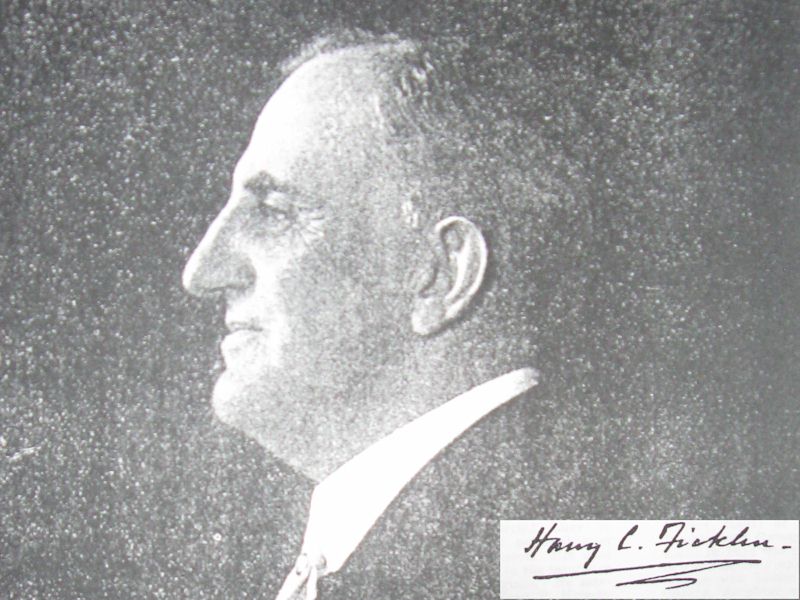There is a great deal of folklore surrounding the history of Harry Ficklen, some of which we have already shared, including a story about his haunted home. We’ve recently found some additional resources about this enigmatic man’s life life, however, that we’d like to pass along in memory of the dear old man who was remembered both as a kind, articulate man of great intelligence and as a mysterious eccentric.
Harry Campbell Ficklen was born in 1862 to John Feilding and Sarah Anne Slaughter Ficklen, descendants both of Virginia colonists. The family moved to Danville in 1860, where the elder Mr. Ficklen became a partner in the banking firm of Johnston & Ficklen, through which he introduced Danville to the National Banking System.
Harry was educated in private schools before attending the University of Virginia where he was a classmate of Woodrow Wilson. He graduated with a Bachelor of Letters and returned to Danville where he taught in the University School before returning to school to study law. His love of writing, however, diverted his attention from those studies and he began writing for pay for various magazines, “Life” magazine, to which he was a major contributor, writing anecdotal articles illustrated by Charles Dana Gibson. The New York World once listed Mr. Ficklen among the most prolific writers of those years and for a long time he maintained a home there.
Harry had several siblings but by the time his father passed in 1872 he was the last living and so inherited his family’s property of Oak Lawn. In later years it was called Ficklen Place, and finally, and notoriously, the haunted Ficklen Field.
“I can’t begin to tell you how many interesting things we were doing in New York,” Mr. Ficklen said in an interview with Julian Meade. “My little comic pieces were appearing in Life. And that very year they gave me my inheritance—the worst thing that ever happened to me, the very worst—”
The place was falling down when Mr. Ficklen received it, and yet he took occupancy and stood careful guard over his home.
“The town was growing fast … and all about the Ficklen Place houses were built and pastures for cattle became streets for men. But Mr. Ficklen, living alone in his dilapidated house, would not sell an inch of his valuable land. … The house was hidden from the street as though it was lost in a wilderness of green: it was said to be ‘hanted’ and the ladies who lived nearby could not keep cooks, so frightened were most … by the very thought of this Ficklen’s Field where spirits were said to walk after dark and the groans of the dead broke the silence of the night.”
And thus the folklore surrounding Mr. Ficklen began. Amongst the people from whom he protected his property were a “tribe” of “dirt-eaters”, who came each morning to collect the sweet red clay that was considered especially fortifying. At all times he was known to carry a small leather bag at his waist, in which some said contained “every mystery and device of the devil.”
Eventually the city stepped in, taking possession of the property and demolishing the house. A portion of old “Ficklen’s Field” was sold in 1927 to Mr. and Mrs. Gordon Tuggle. The Tuggle house, at 127 Westmoreland Court, will be featured on the Danville Historical Society’s Holiday Tour this year (stay tuned for more information on that.)
Mr. Ficklen did not give up his writing upon returning to Danville but began working for the Register.
In September of 1916 he shocked the town by moving out of his haunted home to marry Mary Louise Nelson Tucker. No one thought him the romantic sort, but the match made sense in certain respects. Mrs. Tucker, “one of the loveliest and gentlest ladies ever to live along the Dan … was uncommonly learned and she had married a man whose quantity of learning … was beyond dispute. Harry Ficklen was a source of Latin and Greek quotations, classical gems, elegant words: just as Richmond was said to need no public library with James Branch Cabell still scouting among the dictionaries, so Danville needed no higher source of wisdom than the really friendly and gracious old man.”
Mr. Ficklen, who had some interest in politics, and had maintained his connection with Woodrow Wilson. He was known as a truly gifted orator and spent one term in the Virginia House of Delegates before once more returning to a quiet writer’s life in Danville.
At his death in 1937, the Bee published a tribute to the much misunderstood man. “Some people used to shake their heads and to say that Harry Ficklen had misapplied himself and that he could have gone far in national affairs. But that was not the character of the man. He loved the people amongst whom he lived, he loved to champion the cause of the poor man and by the power of his imagination often raised their issue to magnitude. … We shall remember him always as a stalwart figure marching up Main Street with his head up, the gleam of battle in his eye, a cigar vicariously lit carrying the little brown bag which intrigued the imagination of Danville people for thirty years.”

So interesting! And so well written!